Rebecca Black just turned 18 and she’s forgotten how to flirt. It’s a problem. She might be at a party in a circle of friends, all of them egging her on, with an attractive and available-seeming (but not too available) guy standing just across the room, almost within earshot, occasionally stealing glances at her between sips from a perspiring Solo cup. But if Black actually tries to talk to this guy, even if he’s perfectly nice and funny, even if he compliments her wavy brown mermaid hair and natural California-king smile, she will inevitably freeze or, worse, say something that will make her want to bury her head in her hands and vanish into a pillowy wisp of smoke, Harry Potter-style.
It’s not that she’s not used to attention from guys — she is. They come up to her at the flea market or sometimes on the street, decent and smiling in a way that makes her daydream. But it’s what happens shortly after, once the small talk has gone limp, or maybe a few days later over text, that has caused her to put a moratorium on engaging with strange men altogether. “You look really familiar,” they’ll say, just like you would if you were in their shoes. “Do I know you from somewhere?”
“And then it will click and that will be it,” Black says, venting in a cheap French bistro in West L.A. “It sucks.” Her usually sunny demeanor dims slightly and she averts her big brown eyes, hesitating momentarily as if fondling the keys that launch the nukes. “Their whole attitude will change, or they’ll get really shy. I think it’s really intimidating for a lot of people, but I don’t know why. It’s not like I’m Selena Gomez or something. I’m a pretty nice, normal person.”
Nice? Totally. But normal? That’s more complicated. Everyone remembers Rebecca Black. More than four years ago, when she was 13 and zealously Auto-Tuned, beaming directly into the camera and sing-talking a diabolically mindless and improbably innocent ode to the weekend, she was inescapable. The video for her song “Friday,” which was written and produced for Black by the now-defunct vanity production company ARK Music Factory as a gift from her mother, became the fastest-spreading amateur viral video of all time when it was released in 2011, drawing more than 100 million views in just over 30 days.
You remember it. Girl wakes up in bed with comically out-of-control frizz, girl has manic craving for cereal, girl faces an unexpectedly crippling dilemma over “kickin’ in the front seat” or “sittin’ in the backseat,” girl climactically lists the days of the week. The lyrics of the song, staged in the video with fanatical literalism, took pop music’s tendency to amplify only the most common human experiences to brazen extremes, until their content bore all the conceptual nuance of a Fisher-Price See ’N Say. Patrice Wilson, the founder of ARK, who delivers a bewildering rap verse in the video, said at the time that he wanted to write a song that “was really simple but something that sticks in people's head. To have people say, 'I hate this song, but I'm still singing it.’” The successful result sounds like someone having a really fun stroke.
Black and her mother, Georgina Marquez, say the video for “Friday” was never supposed to be made public, and instead was meant for sharing among friends and family, like glamour shots or a wedding video. But ARK posted “Friday” to its YouTube page, where it was eventually picked up by early viral content portal The Daily What and the blog of comedian Daniel Tosh’s Comedy Central show Tosh.0 (the latter headlining its post simply “Songwriting Isn’t For Everyone”).
Reaction was swift and predictably ruthless. As the view count ticked into the millions, laughing at “Friday” became a national pastime, an instant mood-booster for restless cubicle dwellers, and the perfect foil for armchair music critics bemoaning the downfall of songcraft in the Auto-Tune era. Dubbed “The Worst Song Ever” by a rare consensus of people with two ears and a broadband connection, it was covered by Jimmy Fallon and Stephen Colbert on Late Night, and by the kids of Glee. Black herself, then in eighth grade, went on a major talk show tour, appearing on Good Morning America, MTV, On Air With Ryan Seacrest, and The Tonight Show, where she wore a cardigan with hearts on it and commiserated about bad reviews with Bradley Cooper.
Maybe more than any other 18-year-old alive, Black is all of our anxieties about oversharing online made flesh: the fact that more than 350 million photos are shared to Facebook each day and 300-plus hours of video hit YouTube every minute; the nagging sense that kids born into a world where social networking exists are worse off — when it comes to college applications, job prospects, romantic relationships. For most of us, these fears are as vague as they are persistent, a concern filed somewhere in the back of the brain near jury duty and gum disease. But for Black they’re reality. And, as luck would have it, her overexposure came just moments too soon in the history of the viral video industrial complex to translate into anything resembling a sustainable career. When it comes to making traumatic first impressions on the internet, Black is patient zero.
At the peak of "Friday"-mania, however, a frenzied few weeks in the spring of 2011, Black was almost surprisingly good-humored and cheerful about her notoriety in interviews. In a GMA segment, she smiled while recounting death threats and gamely sang the national anthem in support of a modest claim that, sans Auto-Tune, she did actually have “talent on some level.” If she was a laughingstock, she seemed in on the joke, later filming a Funny or Die video in which she explained that “Friday” was really a veiled critique of America’s foreign and economic policies.
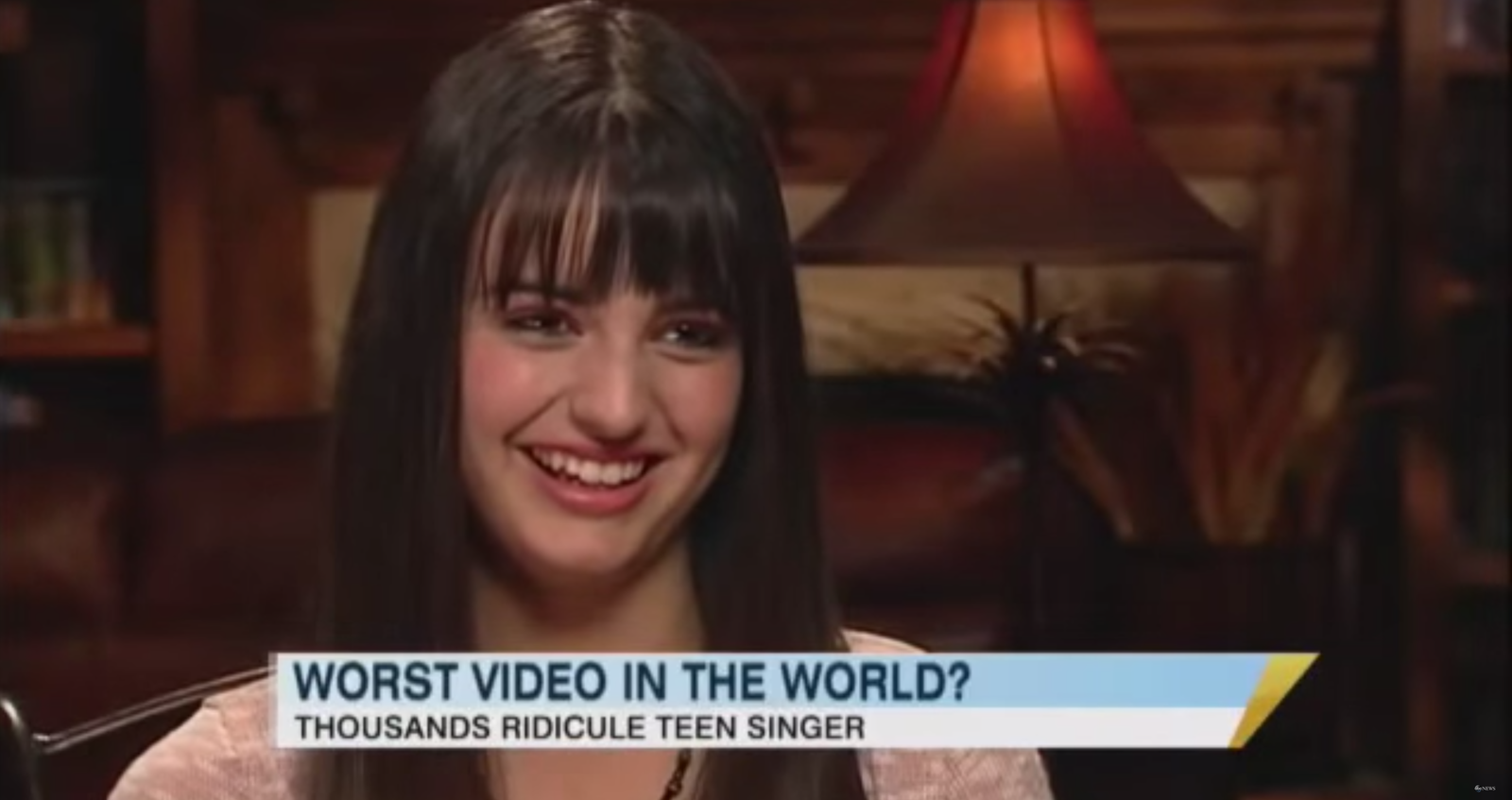
Black hired a high-powered manager, on recommendation from Seacrest and others, but a handful of follow-up songs and videos debuted to diminishing returns. Eventually, the country’s fascination with her and “Friday” fizzled, as it was destined to even before it began. By the time she was offered a dream cameo as Katy Perry’s BFF in the video for Perry’s hit “Last Friday Night (T.G.I.F.)” that June, Black already felt like a dated pop culture reference. She took her place on the Mount Rushmore of weird internet stars: Tay Zonday, Chris Crocker, Double Rainbow guy, Rebecca Black. She was 14.
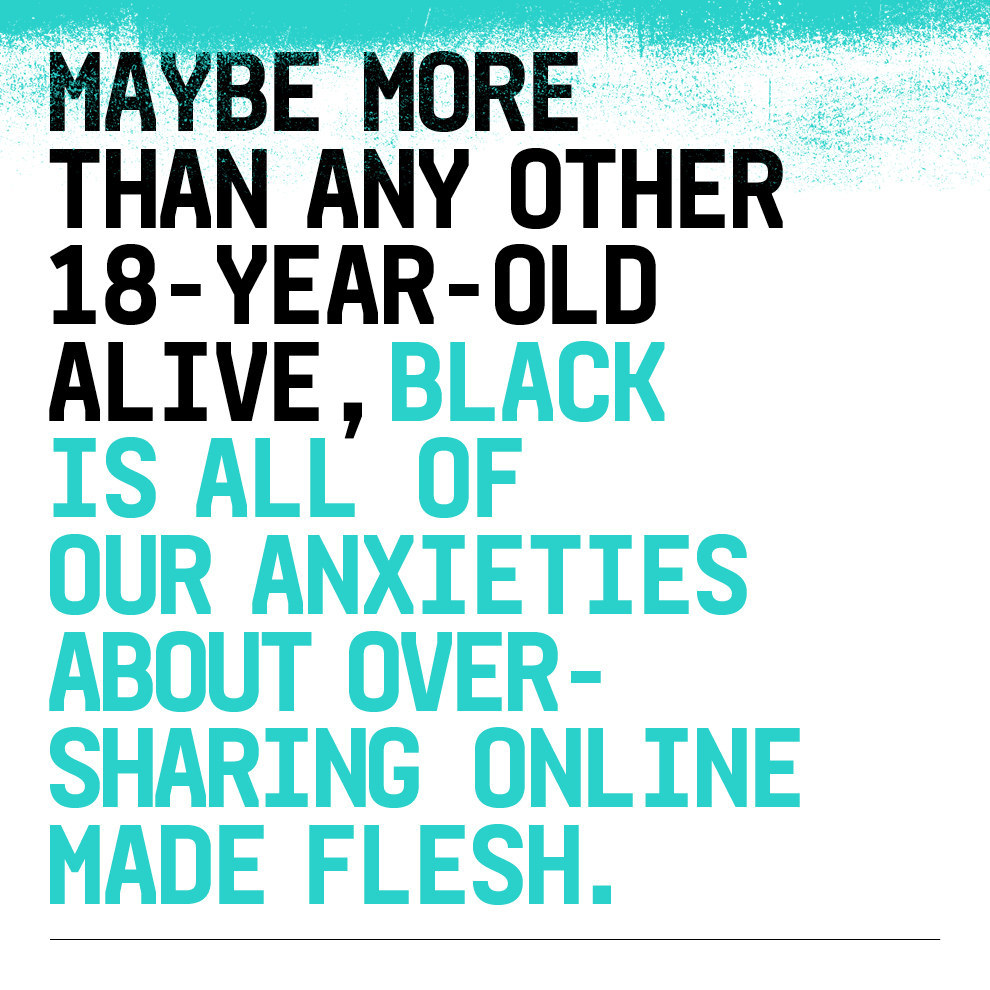
On a golden recent afternoon in Culver City, Black is furniture shopping in one of those dimly lit, cavernous galleries that make $475 fur dining chairs seem like a good idea. Wearing an oversize blue-and-white patchwork plaid button-down, shredded denim shorts with the pocket pouches exposed, and white sneakers, she’s more mature than you remember her, with a noticeably deeper, lisp-free voice and emerging bone structure where a baby face used to be. With olive skin, long dark hair, and the kind of lips that start flame wars on celebrity gossip blogs, she could be a Kardashian who failed to inherit the vamp gene.
In a week, Black will move out of her mother’s house in Orange County and into her first apartment in Brentwood, most known as the affluent neighborhood where O.J. used to live, but now, thanks in part to its adjacency to the multichannel network AwesomenessTV, is earning a reputation as home to a growing number of YouTube stars too young to remember the Bronco. Three weeks ago, she graduated from Villa Park High School, where she transferred after two tumultuous years of being homeschooled as collateral for pursuing music. And just two days ago, she celebrated her 18th birthday with sushi at Nobu, chasing a night out with a pair of miraculously tasteful tattoos the morning after — three vertical dots on both middle fingers — her first.
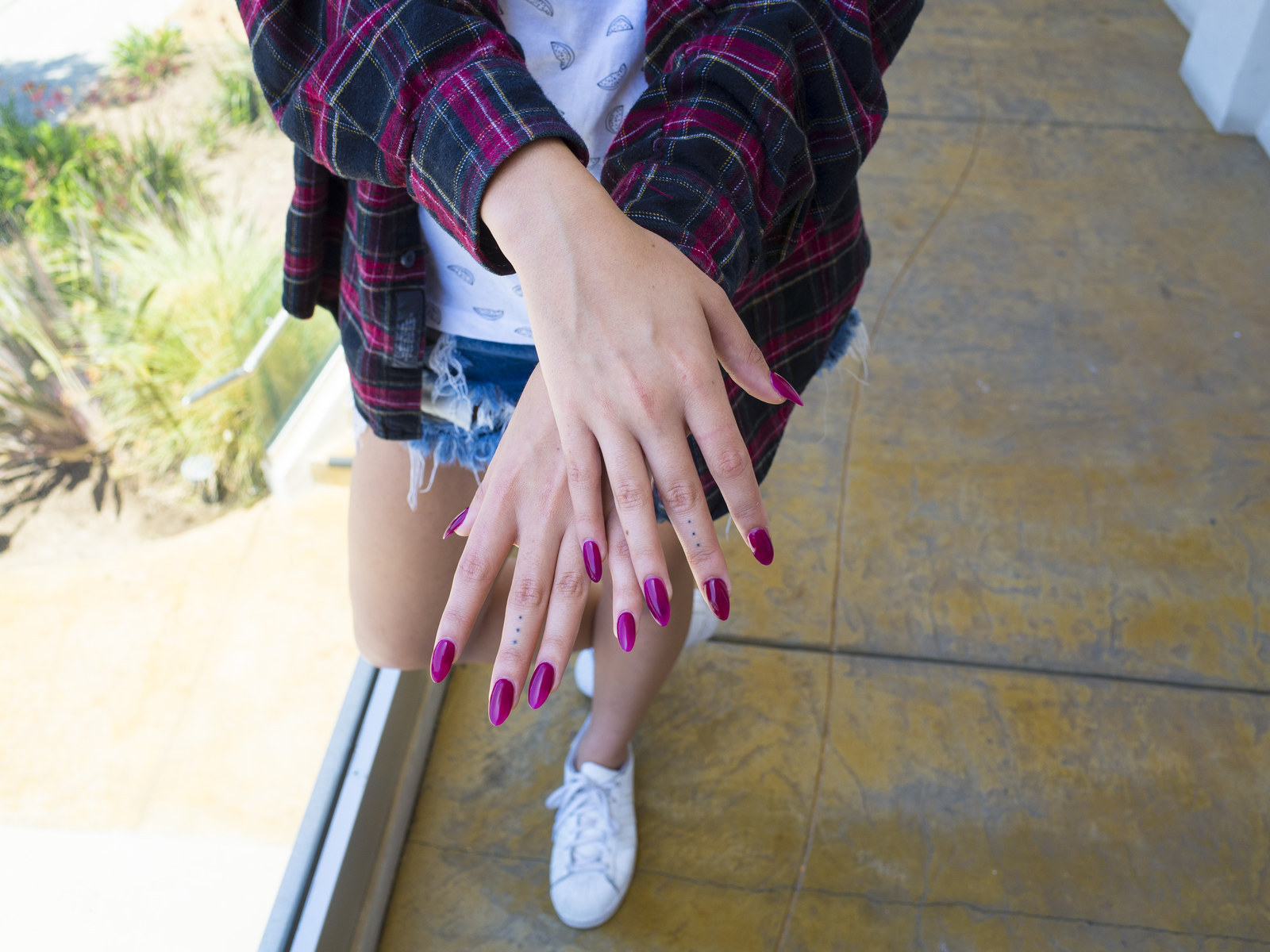
Black spies an angular wooden dining table she likes and flings extravagant, forest-green nails at her cell phone to send a pic to her friend and future roommate Andrew Lowe, whom she met through YouTube. Today Black has over a million subscribers on the platform, almost all of them her age and younger, where she posts silly weekly videos and answers questions about how to navigate school drama, how to be a better friend, and what to do about bullying.
“Even with my friends, I've always been the one that will help them out with situations,” Black says. “People can vent to me all day; I’ll listen to it.”
When “Friday” exploded, the YouTube community was a dubious ally — a source of more snark and vitriol than moral support; but now it’s home. Black’s life revolves around the platform — her entire friend group, amassed online and at annual gatherings like VidCon, consists of fellow YouTube stars, including ThatSoJack (1.2 million subscribers) and JennxPenn (2 million subscribers, a book deal, and a new movie) — where she’s regarded as something of a grizzled veteran. In Black’s story, middle and high school–age kids enmeshed in the unlovely “before” phase of life see a survivor and a role model, someone who lived through a social media nightmare of epic proportions and managed to emerge unbroken.
She almost didn’t make it through. When Black was in eighth grade and the fastest-rising search term in the world, the highs were so dizzying and surreal that she could scarcely wrap her head around them. For a girl like her — a dancer and singer from the time she was 3 years old, a ham in the local youth choir and school plays who could sit in front of the TV watching Hannah Montana and American Idol for hours — “Friday” had all the markers of a godsend. Suddenly Justin Bieber and the Jonas Brothers knew her name. Lady Gaga — then at the height of her incendiary powers — called her a genius.
But, like a wish granted by dark forces, what should have been a dream world had been warped from its inception. In school, Black became radioactive and lost almost all of her friends due to “Friday.” “I couldn’t really relate to what my friends were going through anymore, and they couldn’t really relate to me, either,” she says. When requests for appearances and interviews started to overwhelm her schedule and sink her grades, she pulled out of school entirely and switched to online courses at home, just weeks before the end of the school year.
“All of a sudden, I had to grow up really fast.”
Part of the reason Black was able to smile on camera through the “Friday” debacle was because she had learned previously how cruel people could be, and how that cruelty always said more about the afflicters than the afflicted. Near her 12th birthday, two years before she would become the butt of a million jokes on the internet, she had been forced to change schools due to what her mom describes as severe bullying from “mean girls.”
When she first saw the callous tenor of the response to “Friday” online (sample comment: “I hope you cut yourself and die”), Black’s mom, understandably, asked Black if she wanted to take the video down and withdraw from the unsparing scrutiny of the web. But Black surprised her by protesting the suggestion, calling it insulting.
“She said, ‘No, it's my right to have my video up there. Why should I have to take my video down?’" Marquez recalls. “And that was the moment that did it for me. From that point on I was like, You go, girl. We got this."
“I’ve always had a pretty thick skin — that’s just how I am,” Black adds. “When I get nervous, or uncomfortable or sad, I just try and make light out of it and laugh.”

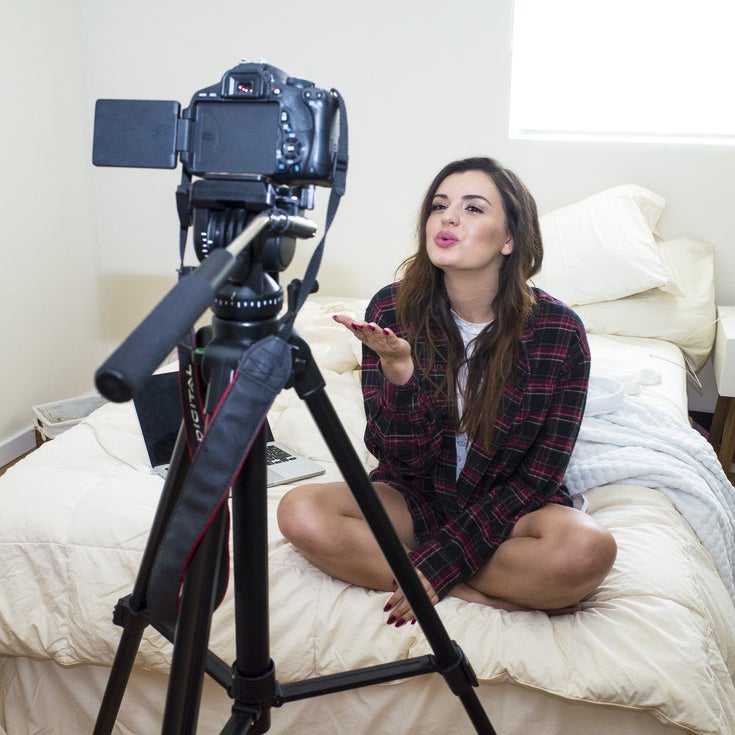
Even more intractable than haters online were the machinations of the popular music industry. Black’s mother paid $4,000 in two installments to ARK Music Factory to produce “Friday” (she says claims in the media about her family’s wealth are overblown), hoping the experience would give her only daughter a sampling of what it would be like to pursue her dreams of pop stardom. When, incredibly, that sampling turned into a gorge, Black and her family reoriented themselves to try to make the most out of the opportunity.
Black’s parents, both veterinarians, knew little of the entertainment business, so they hired veteran talent manager Debra Baum, whose previous clients had included Paula Abdul and Tears for Fears. Baum immediately set out to capitalize on the momentum of “Friday,” fielding press and business inquiries and pursuing a deal to record an album. On the latter front, meeting Perry proved instrumental: The pop superstar introduced Black to key industry contacts after they worked together on the set of “Last Friday Night.” In the spring and summer of 2011, Black says she entered into serious discussions with several major labels.
Meanwhile, the relationship between Black and ARK began to sour. She and her mother got into a legal dispute with Patrice Wilson and his partner Clarence Jey over control of the master recordings of “Friday” and its video, which, having just crossed 165 million views on YouTube, was generating large sums in royalties. After ARK put up a paywall in June 2011 requiring users to pay a $2.99 rental fee to view “Friday” in lieu of standard preroll ads, Black’s family successfully petitioned to have the video pulled from the platform altogether. Wilson didn’t respond to requests to comment for this story, but Jey, via email, denied the accusations that ARK illegally withheld the “Friday” masters and said he wasn’t involved in imposing the rental fee.
“I have no idea why or who [put up the paywall], as I was not managing the YouTube channel,” Jey said. “It was very random, perhaps experimental, and, in my opinion, silly.”
Eventually, the two parties reached an agreement in which Black owns both the video and the song recording, and Wilson and Jey receive a minority percentage of royalties from both as the songwriters. Black reposted “Friday” to her own channel in September 2011, where it was once again free to view, with the caveat that the view count had to be reset to zero. By YouTube’s estimate, cumulative views for “Friday” today would be upwards of 250 million.
By the time the video resurfaced, however, Black had other problems. After months of promising negotiations with a major label she declines to name, she was just a day away from an in-person meeting to sign papers when she got a call that the label was choosing not to move forward. She felt the wind go out of her. “We didn’t know how volatile the entertainment industry is,” Black’s mother says now. “That people can just pull the plug on things last minute.” To this day, Black isn’t sure exactly why things fell apart (the official excuse was executive turnover), but at the time viral stars — even those without baggage like hers — were still considered to occupy a lower caste than those produced by the industry.
Had it been released today, “Friday” almost certainly would have gone to No. 1 on Billboard’s flagship singles chart the Hot 100 (which began counting YouTube streams in its formula in 2013), a distinction that, for an unsigned artist, would have made a recording contract a foregone conclusion. Black’s status as a previous unknown with a catchy but readily mocked hit would be far less anomalous in a mainstream that has stretched to accommodate songs like Psy’s “Gangnam Style” and Baauer’s “Harlem Shake.” But in 2011, YouTube was still widely regarded as a sideshow in the industry. Even Miley Cyrus, Hannah Montana herself, found the idea that a YouTube star could be mistaken for a serious artist beyond the pale.
"It should be harder to be an artist," Cyrus spat in an interview with Australia's Daily Telegraph two weeks after “Friday” went viral. "You shouldn't just be able to put a song on YouTube and go out on tour."
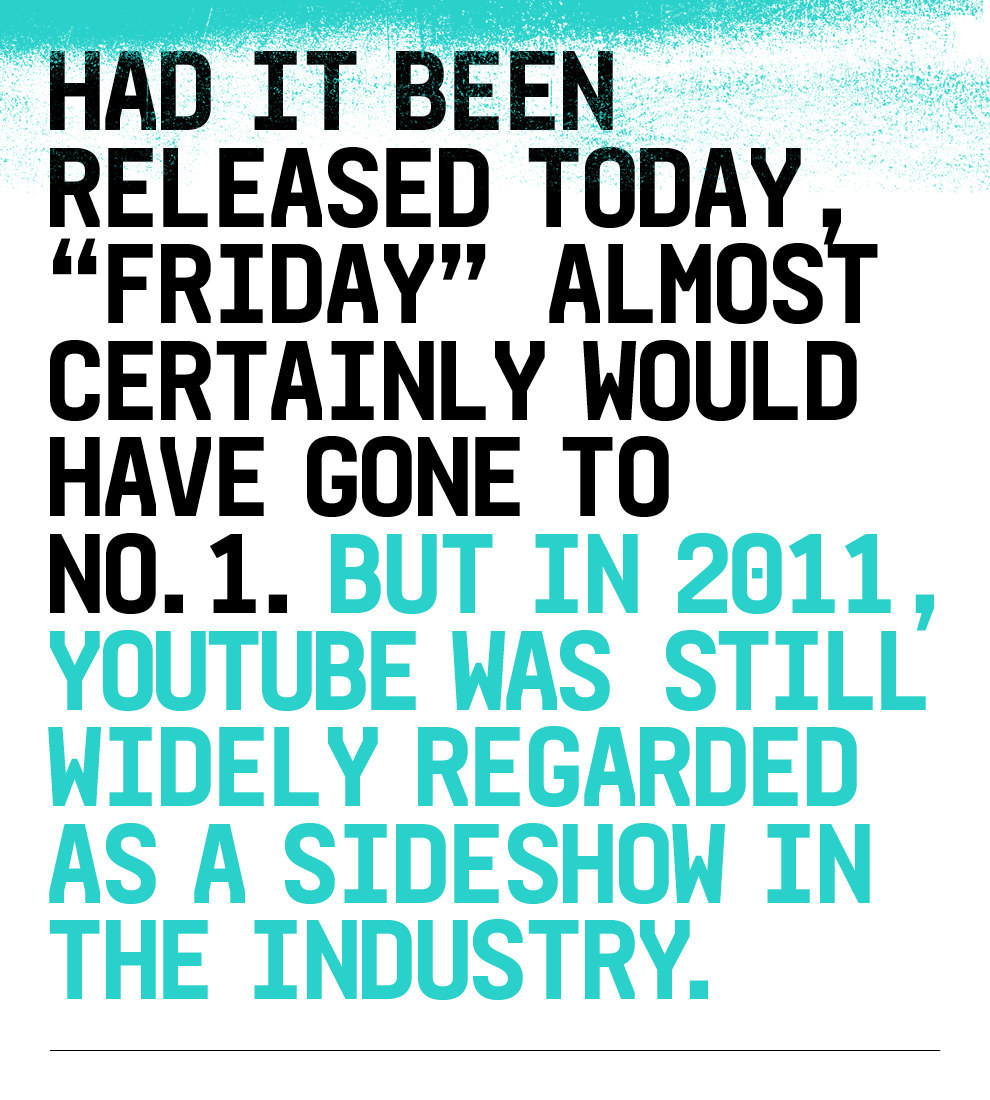
More than the initial wave of backlash to “Friday,” Black says the two years she spent chasing its shadow marked the bleakest time in her life. Homeschooling left her isolated with scant interactions with people her own age. She would spend hours on the internet reading negative comments and articles about herself, wondering if she’d ever amount to anything worthwhile.
“2012 was probably the year that I struggled the most,” Black says. “I really didn’t have friends, and there was nothing to distract myself but me. I would just sit and pick myself apart, like, What am I supposed to do?”
To make matters worse, she felt oppressed by Baum, her manager. Black says that Baum, who didn’t respond to multiple requests to be interviewed, controlled every aspect of her life and career with imperiousness, insisting that Black’s public persona hew as closely to the one presented in “Friday” as possible. Baum would frequently veto Black’s choice of outfits, Black’s mother says, and insisted that she keep her naturally wavy hair straight, since that’s how she had worn it in the “Friday” video.
Musically, Baum wanted Black to record songs that sounded similar to “Friday” — heavily processed bubblegum trifles — but with lyrics that were slightly less insane. A string of such songs were released between 2011 and 2013, with perfectly vacuous titles like “My Moment” and “Sing It.” Black asked Baum if she could try her hand at writing or co-writing but was rebuffed. “[Baum] would be like, ‘This is a song that was sent to you; you should do it. This is what you’re gonna do,'” Black says. She felt trapped. Part of what made being saddled by “Friday” so maddening was that she had been so secondary to it all; it had been someone else’s words, someone else’s decision to publish the video, someone else’s decision to plaster it across the internet. Like any 14-year-old, she was burning for the freedom to experiment with her identity, her body, her voice — but it was Baum calling all the shots.
One night, after a Teen Choice Awards ceremony where she won Best Web Star, Black was due to appear at a post-show dinner when she shut down. It had been a particularly exhausting week of going to appearances and premieres, shoved into clothes that made her uncomfortable and indulging the too-clever questions of adult journalists who interrogated her with self-satisfied smiles. Black told Baum she wasn’t going anywhere and locked herself in her hotel room.
“She just didn't have it in her anymore, to have to continue to put on a happy face,” Black’s mother says. “Who would?”
In June 2013, after recording 15 songs she says she hated for an album that was never released, Black fired Baum. That same month, on her 16th birthday, she posted her first weekly video blog to YouTube. The rush was immediate and satisfying. “I felt like I could give people insight into who I really am beyond just The ‘Friday’ Girl,” she says. “It was like, ‘This is Rebecca.’” Finally, she was in control.
This January, Baum was charged by the L.A. City Attorney’s Office with bilking a separate family out of $110,000 in illegal representation fees over seven months in 2012. Last month, she was convicted and sentenced to 36 months of probation and 45 days in jail or 20 days of community service. Black’s mother says that Baum never took upfront fees from her daughter for her services and was paid only a percentage of Black’s earnings, as is customary for managers. Though other managers later told her that Baum’s fee was “ridiculously high” compared with the market average, Black’s mother says she doesn’t regret hiring Baum, who she believed represented her daughter’s best option at the time.
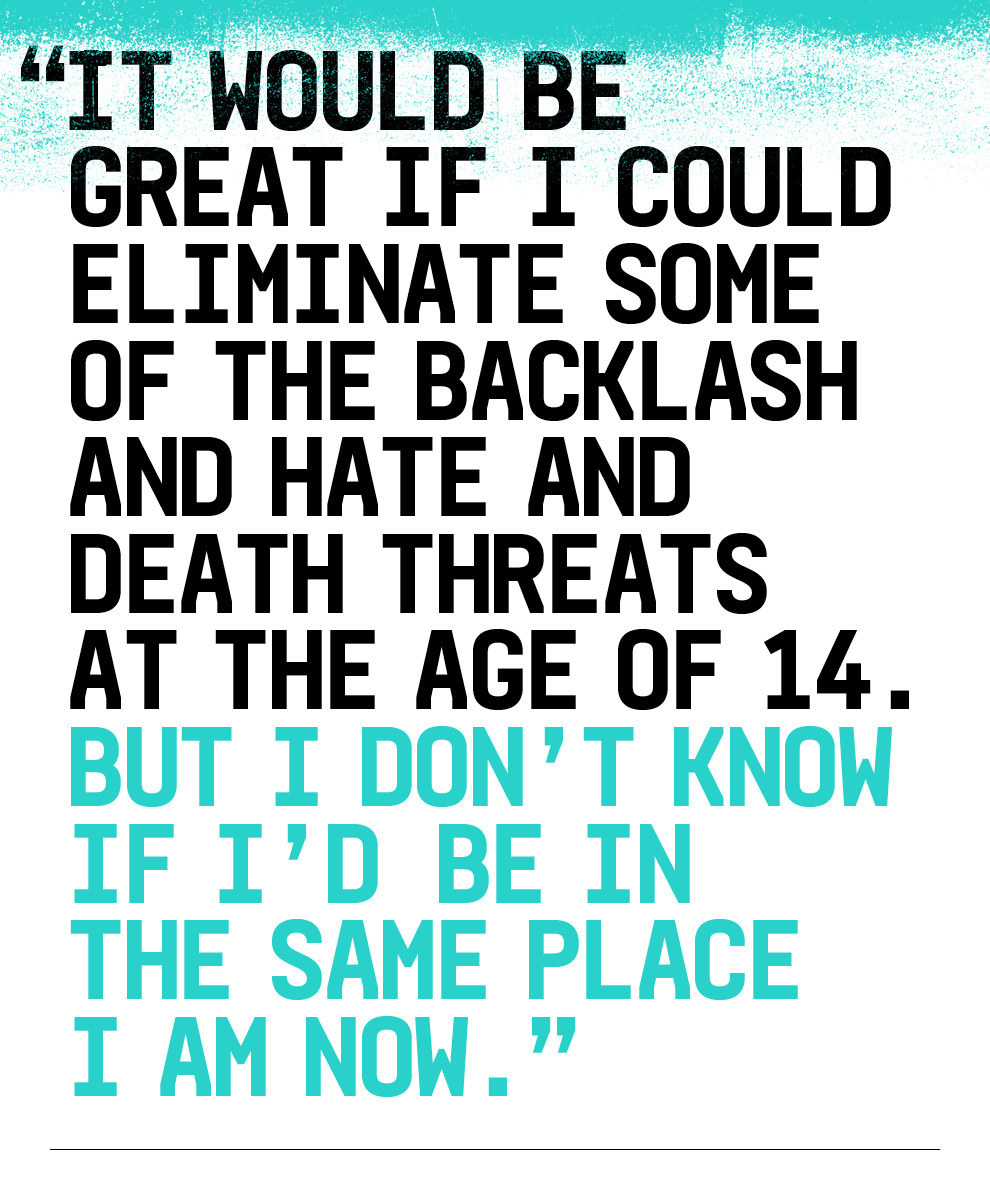
After the furniture shopping outing, we’ve just escaped from the clenched fist of I-10 when Black grits her teeth and makes one of those terrifying left turns where the light has turned red but you’re stuck between cars in the middle of the intersection. We’re in a tiny white Mercedes convertible Black has been borrowing from her mother for the last three months, a felicitous upgrade won the hard way: by crashing her own Hyundai Elantra. At the moment, though, any feelings of mortal peril are being tempered by visions of Childish Gambino, the rap persona of actor and comedian Donald Glover, who Black is explaining has replaced Justin Bieber in the totally-proverbial-but-maybe-wasn’t-always shrine in her bedroom.
“Ugh, he’s amazing,” Black sighs. “I saw him at Lollapalooza last year and that was probably the best moment of my life.”
Owing in part to her quasi-celebrity, Black doesn’t actually have a ton of experience dating. At the public high school where she transferred two years ago after relieving Baum and hitting the brakes on her music career, she went out of her way to keep a low profile, avoiding dances and big parties where rumors might get started.
“There was a big one for a while where everyone thought I was a cokehead,” Black says in a way that suggests she’s heard every one in the book. “I’ve never done drugs in my life!”
In general, transferring into junior year of high school as Rebecca Black was about as daunting as you’d imagine. And things did get pretty ugly at first. Beyond the rumors, kids would TP her house frequently, or throw fruit at her at lunch, or pour milk in her locker. Those who weren’t outwardly hostile would cast long glances in the hallway, or act weird when she entered a room.
Ooh, Rebecca Black, they seemed to be saying. I bet you think you’re hot shit.
Eventually, Black found a few friendly souls who didn’t care about her past, who could see her for who she really was — an ordinary person who once had something extraordinary happen to her but was just trying to survive the next two years like the rest of them. In an era when anyone’s most embarrassing moments can be easily enshrined in the global and enduring hall of shame that is the web, there’s honor in embracing post-"Friday" Rebecca Black. If she can be happy, in the end, isn’t there hope for everyone?
Black’s high school friends, whom she reverently calls “the most normal girls you can imagine,” encouraged her to report the harassment she was experiencing to the school’s principal, who subsequently had a security camera installed by her locker. Things calmed down.
“It was like people forgot I was there,” Black says. “Which was good.”
Black’s plan, post-graduation, is to pursue music on her own terms for the first time — no managers, no prefabricated songs, no suffocating expectations. She’s teamed with the producer Eddie Wohl, an unlikely collaborator whose prior credits include albums with the rock and alt-metal bands Fuel and Ill Niño, with whom she is writing and recording an album she hopes to shop to record labels by the end of the summer. She’s in the studio most days and takes vocal lessons at least once a week.
The artist Black says she would most like to emulate, perhaps unsurprisingly, is Taylor Swift, whose ability to successfully switch genres — and to be graceful under intense spotlight — she finds inspiring. “She’s the best businesswoman in music right now,” Black gushes. “She’s killing it.” Black’s new songs, based on two nearly complete demos she sent me, sound like Swift — bright and confident with soaring rock drums and dramatic hooks that work best sung at the top of your lungs while cruising down the highway. Her voice is capable and Auto-Tune–free. One song, titled “Time of My Life,” is an exceedingly catchy exhortation to do the kinds of things that tend to be a lot more fun in songs than they are in the real world, like “Dance in the rain” and “Let down your guard.” The other, called “Last One Standing,” is edgier and, given its author, more than a little layered with meaning.
The fire in the stars / Keeps burning what I’m wishing for
I will carry on / Pick myself up off the floor
They say run, run, run / Run away, run away
I have just begun / So hear me say I’m here to stay
In Black’s mother’s car we pass the apartment building that Black will share with Lowe, her YouTube friend; it's a handsome, white townhouse with high ceilings flanked by palm trees. Black has a deal with her parents that, as long as she’s supporting herself, she can put off college for two years while she tries to get her music career off the ground. Although she’s not sure exactly how much money she’s personally earned from downloads and streams of “Friday,” she says it’s several hundred thousand dollars in total, a cushy consolation that has largely gone into savings.
On her favorite street, San Vicente Boulevard, Black points out two restaurants, located across the street from each other, where you can get “the best brunch you’ll ever have” after a long night out. One restaurant specializes in sweet foods, the other savory. “My friends and I are big brunch-heads,” she says, by way of confession.
When Black’s not making music or filming YouTube videos, she and her friends do what any financially unburdened young adults would do if living in paradise away from home for the first time — go night-swimming at the beach, make spontaneous trips to 7-Eleven at 2 in the morning, spend so much time at one another’s places that every day feels like an endless slumber party.
Black’s biggest fear is that she’ll never be taken seriously, that no matter what she does in life, she’ll only ever be known as “The ‘Friday’ Girl.” But, if given the chance, would she take back “Friday”? Save herself from ARK Music Factory, and Good Morning America, and bullies, and industry heartache?
“It would be great if I could eliminate some of the backlash and hate and dealing with death threats at the age of 14,” Black says, thinking carefully. “But at the same time, I don't know if it was any different if I'd be in the same place I am now, and if I'd have the same opportunities.”
There is one specific line in the song Black admits she would change. It comes up often, even now, whenever she has to ride in a car with friends. “The ‘front seat, backseat’ thing,” she says, shaking her head, sounding as close to exhausted as she has all day. “That’ll stick with me forever.”
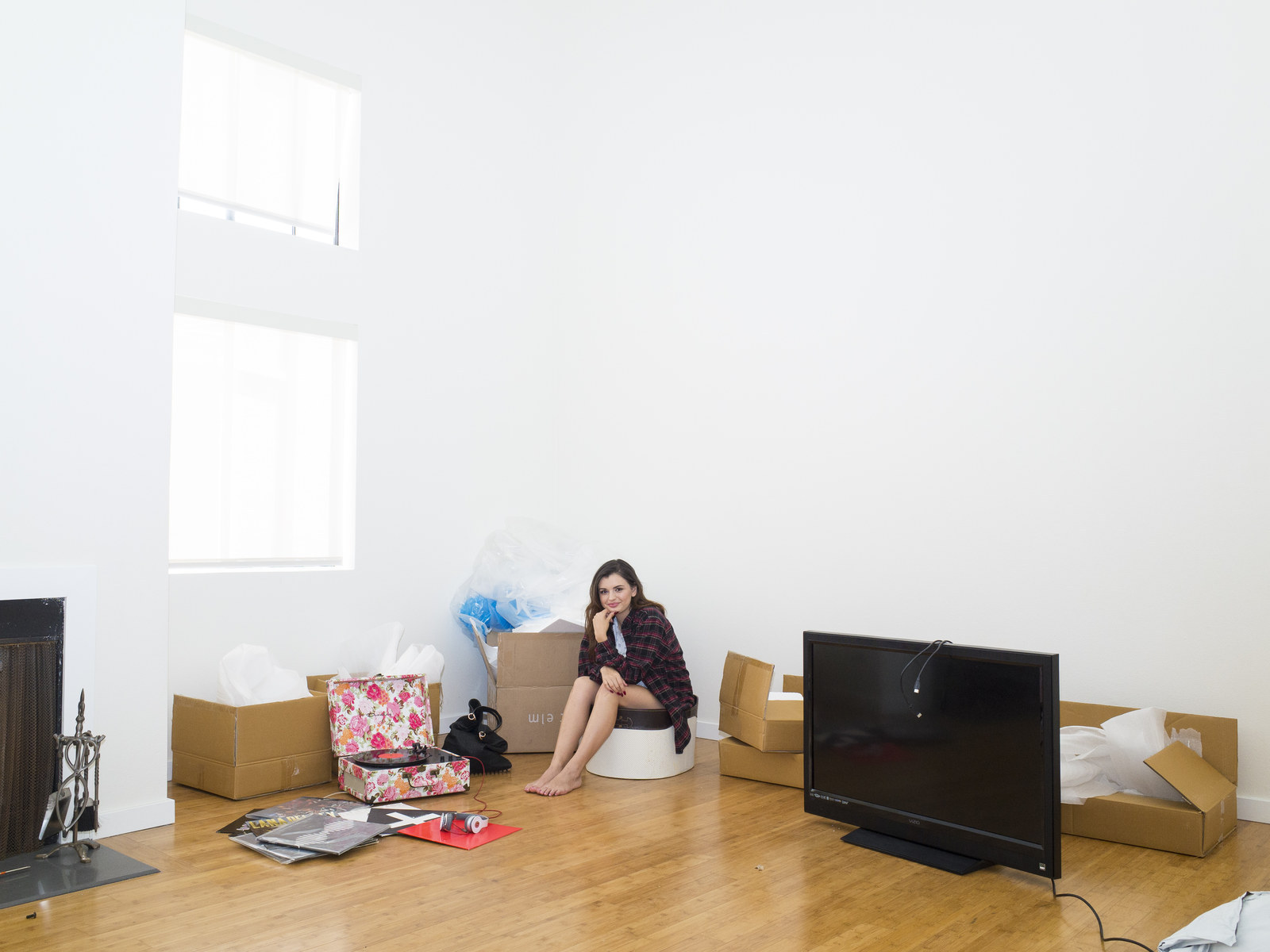
Music Week is a week of content that celebrates the awesome classic jams, artists, and music videos you grew up with — as well as future classics. Take a step back in time and check out more great music content here.



